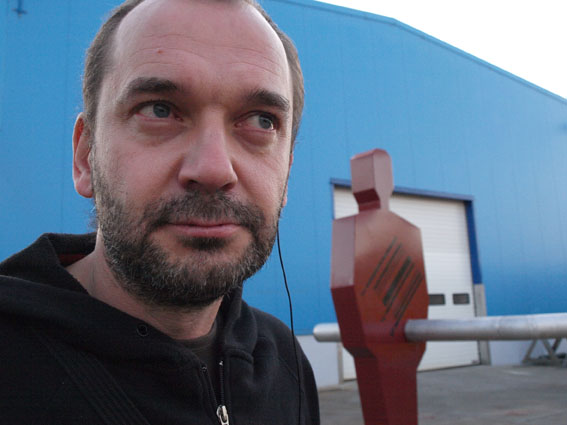 |
| One of Ai Weiwei´s finger installations |
“The artist is not an innocent and secluded monk or nun living through his or her own individual obsessions – the artist is part of a power network, an ideological machine.”
Artur Zmijewski, 2 April 2008, My History of Art series, Centre for Contemporary Art, Ujazdów Castle, Warsaw, Poland.
 |
| Artur Zmijewski--curator for 7th Berlin Biennale |
Even though it´s been many years since I set foot in the Kreutzberg barrio of Berlin, then West Berlin, and like Radio Berlin, the city´s energy still surges through me.
Polish sculptor and contemporary artist-curator Zmijewski, a product of the Soviet arts regime and now a consummate arts activist, is sifting through 7,500 applications for the 7th Berlin Biennale (28 April – 1 July, 2012).
Berlin last September named the Warsaw-based Zmijewski to curate the 7th Biennale, to design the thematic architecture of the contemporary art fiesta.
Ai Weiwei & Zmijewski in Berlin: The Perfect Storm?
| Ai Weiwei |
Weiwei, I predict, will be there in Berlin with Zmijewski, alive and well and flourishing, making Berlin the contemporary art hotspot of 2012.
A leading force in post-Soviet critical art in Poland, Zmijewski published his “Applied Social Arts” manifesto in the 1990´s advocating art social and political activism.
The stage was being set for these two powerful contemporary art figures and forces to fuse a powerful arts activism agenda for the 7th Berlin Biennale.
The German connection, already established between Weiwei and Berlin and likely Zmijewski, grew stronger after Chinese security forces nabbed Weiwei on 3 April at Beijing´s airport.
The Beijing buzz is Weiwei was enroute to Berlin via Hong Kong when he was disappeared.
Age of Disillusionment?
| Ai Weiwei´s finger of fate aimed at U.S. White House |
The future had looked promising for German – Chinese cross-cultural cooperation.
All starting with a lavish and expensive German sponsored exhibition—“The Art of the Enlightenment”—opening 1 April at the National Art Museum of China in Beijing.
But paranoia flowing from China´s ruling oligarchy spoiled the party.
China refused German Sinologist and author Tilman Spengler a visa. Spengler was invited to speak at the exhibit´s gala inauguration.
Spengler, however, was not welcome, having publically praised Nobel Peace Prize Laureate, Liu Xiaobo.
Germany cried foul on two counts: Spengler´s visa denial and Ai Weiwei´s detention.
Two days after its opening, the Age of Enlightenment morphed into the Age of Disillusionment.
| Ai Weiwei´s image grows larger |
German cultural coalitions demanded the Art of the Enlightenment´s return.
It had already proved a dismal failure with only about 200 daily and 400 weekend viewers, according to online reports.
I think Socrates once said, however, “It is better to light one candle than curse the darkness.”
Germany did the right thing for the right reasons and continued promoting the age of enlightenment shedding light within dark shadows of a dictatorial regime.
Media War Games
Germany´s media launched a blitz of attacks against Chinese detentions and an obvious crackdown on freedom of expression.
China hit back at German media.
It demanded Germany “…look at this issue (Ai Weiwei) objectively, respect China´s judicial sovereignty and respect China´s judicial departments´ independent handling of this case,” Chinese spokeswoman Jiang Yu said this week.
Meanwhile, the German Academy of the Arts not only demanded Weiwei´s immediate release but made him a member of their club.
The Universitat der Kunste Berlin had already offered Weiwei a guest professorship, and the artist was busy planning to relocate his studios to Berlin.
The university also sponsored an online petition campaign for the artist´s release.
The art world´s heart grows fonder almost daily with Ai Weiwei´s absence as anyone with Weiwei work launches a show combined with protest.
Weiwei´s image grows larger and larger as it is cast over Chinese authorities.
“The image has become the primary means of mass communication. And it´s worth understanding images, lest we become helpless towards them and they can do whatever they want with us.”
Artur Zmijewski, Warsaw, 2 April 2008.
 |
| "Choice," photograph by Stefan van Drake (2011) |
Rock on and practice peace and love.
Stefan, the ArtTraveler ™ |
| "This Way Out," photograph by Stefan van Drake (2009) |
New ArtTraveler YouTube 11 May video: The Case of the Missing Bronze Grape Picker Statue (and dog).
Check out a sculpture or mosaics workshop or walking tour in our beautiful mountains. See: www.spanjeanders.nl and www.competafinearts.com.
Contact me at stefanvandrake@gmail.com or by calling (34) 951 067 703; from the UK at BT landline rates, 0844 774 8349.
No comments:
Post a Comment